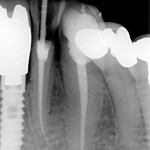
Root canal treatment (RoCT) is commonly performed dental procedure. This usually follows irreversible pulpitis and necrosis of the dental pulp caused as a result of caries, or dental trauma. The aim of this study was to evaluate the outcome of single- versus 2-visit root canal treatment of teeth with apical periodontitis after a 2-year follow-up period.
Patients with radiographic evidence of apical periodontitis (minimum size ≥2.0 x 2.0 mm) and a diagnosis of pulpal necrosis were included. Other inclusion criteria were a non-vital pulp and apical periodontitis with or without a sinus tract; negative response to hot and cold pulp sensitivity tests; presence of enough coronal tooth structure for rubber dam isolation; no previous endodontic treatment of tooth and no analgesics or antibiotics prior to the clinical procedures. Patients were randomised (block randomization) prior to the clinical procedure patients undergoing 2-visit treatment has second appointment at least 1 week after 1st appointment. Teeth were evaluated clinically and radiographically at 2 years. Radiographs were coded to blind evaluators.
What did they find
- 287 patients (300 teeth) were randomised
- 155 teeth were allocated to single visit and 145 to 2-visit treatment.
- 18 teeth were lost to follow up, 9 from each group.
- At 2 years there were no significant differences between the groups
- 96.57% (141 of 146 teeth) in the 1-visit group were classified as healed
- 88.97% (121 of 136 teeth) in the 2-visit group were classified as healed
The authors concluded
This study provided evidence that a meticulously instrumented 1-visit RoCT can be as successful as a 2-visit treatment. There was no significant difference in radiographic evidence of periapical healing between 1-visit and 2-visit RoCT.
Comment
A systematic review by Sathorn et al in 2005 conducted a systematic review of single versus multiple visits for teeth with apical periodontitis. At that time only 3 randomised trials involving 146 cases could be included. Sathorn found no statistical difference between the two approached although the single visits had a slightly higher healing rate. In 2007 the Cochrane review by Figini et al was published. This included 12 randomised trials and concluded
No difference exists in the effectiveness of RoCT, in terms of radiological success, between single- and multiple-visit RoCT. Most short- and long-term complications are also similar in terms of frequency, although patients undergoing a single visit may experience a slightly higher frequency of swelling and are significantly more likely to take painkillers
Links
Paredes-Vieyra J, Enriquez FJ. Success Rate of Single- versus Two-visit Root Canal Treatment of Teeth with Apical Periodontitis: A Randomized Controlled Trial. J Endod. 2012 Sep;38(9):1164-9. Epub 2012 Jul 26. PubMed PMID: 22892729
Sathorn C, Parashos P, Messer HH. Effectiveness of single- versus multiple-visit endodontic treatment of teeth with apical periodontitis: a systematic review and meta-analysis. Int Endod J. 2005 Jun;38(6):347-55. Review. PubMed PMID: 15910469.
Figini L, Lodi G, Gorni F, Gagliani M. Single versus multiple visits for endodontic treatment of permanent teeth. Cochrane Database of Systematic Reviews 2007, Issue 4. Art. No.: CD005296. DOI: 10.1002/14651858.CD005296.pub2

This contradicts with the study in
http://www.ncbi.nlm.nih.gov/pubmed/22794203
The study you have highlighted has been conducted in extracted teeth whereas the study noted in our blog provided clinical outcomes at two years. This new study is also supported by the systematic reviews noted in the original blog. Consequently I would consider this of more relevance to clinical practice.
The Dental Elf.
What is time duration for periapical healing in periodontitis case after single visit RCT
Thanks.
Lal Baboo
I just stumbled acsros your site. Pretty intriguing topic, it really makes a person think. I am going to have to check out some of your other articles.